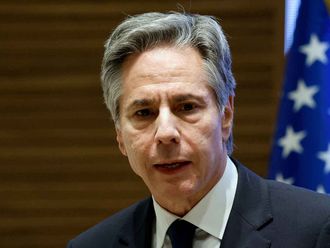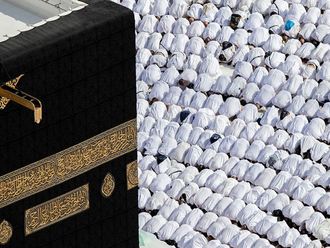Al Mukalla: As members of the separatist South Yemen Council were trickling into the city of Aden, the seat of internationally recognised Yemen government, Prime Minister Ahmad Bin Dhaghar issued a stern warning: tension in the strategic city has reached the boiling point and could spill over into military confrontations.
On Monday, Aidarous Al Zubaidi, former governor of Aden and head of the South Yemen Council, and his deputy, Hani Ben Bourek, a former cabinet minister, returned to Aden and held the first meeting of the council, a step seen by Bin Dhaghar’s government as a coup by their former allies.
Tension between South Yemen separatists and the internationally recognised president, Abd Rabbo Mansour Hadi, increased in April when Hadi dismissed Al Zubaidi and Ben Bourek, triggering angry anti-Hadi protests in Aden and other South Yemen cities. Boosted by a big grass-roots support, Al Zubaidi declared in May the formation of a “transitional political council of the south” that would represent pro-independence southerners and would run the former South Yemen state that unified with the north in 1990.
On Tuesday, Prime Minister Bin Dhaghar warned “hatred and hostility” between southerners who back Hadi and the separatists have reached an unprecedented scale, adding that any armed conflict would ravage the entire South Yemen that is still recovering from Al Houthi and Al Qaida occupation. “Enmity and hostility have been resurrected in an uglier way, and the struggle for influence in Aden is going to a climax. Yes [it is] a conflict of influence. A new round of stupid conflict is being prepared,” he said in an opinion essay published by the state-run media outlets.
He urged pro-independence southerners to help defuse tension or face the consequences that could include the return of Al Houthis to the south. Bin Dhaghar’s warning has been largely ignored by the members of the transitional council who incited their supporters to rally in the city of Aden on Friday to mark the anniversary of what they perceive as “the northerners invasion of the south”.
Reacting to Bin Dhaghar’s statement, many pro-independence officials said that the prime minister was intimidating them to stop voicing their demands or else, he would allow Al Houthis to come back to the south. After years of suppression by ousted president’s regime, mass protests broke out in South Yemen in 2007 demanding reinstallation of thousands of public and military servants who were forced into retirement after a civil war in 1994 when the victorious northerners stormed Aden, the capital of South Yemen state. The separatists said the northerners had monopolised wealth and power after winning the war.
When Hadi decamped to Aden early 2015 after escaping Al Houthi house arrest, southerners threw their weight behind Hadi and the Saudi-led coalition that intervened militarily in Yemen to blunt Al Houthi military expansion and to bring Hadi back to power. To win the separatists’ heart and minds, Hadi installed hardline separatists as governors of provinces. Hadi’s supporters say the president decided to sever ties with the separatists when they began harassing his forces in Aden and forming their own militias.
The separatists say Hadi has allied with northern parties and removed their supporters from their positions.
Inevitable showdown
On Thursday, intelligence officials in Aden told Gulf News by telephone that Hadi and the separatists have deployed their respective forces in Aden ahead of a big rally by the separatists. “Tension between both sides is too high. Military forces are everywhere and in combat mode. A small gunfire would spill over into a wider confrontation,” an official said on condition of anonymity because he was not authorised to speak on record.
However, many local journalists and analysts played down military escalation of the situation in Aden. “I think this would not go beyond trading accusations and threats in media,” Yasser Al Yafae, a journalist based in Aden, told Gulf News.












